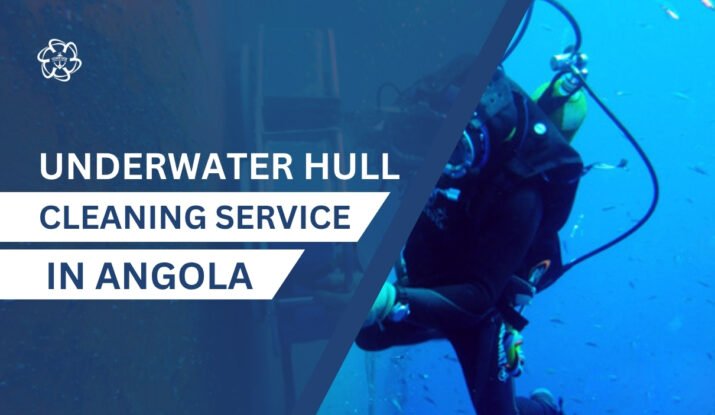Underwater Hull Cleaning in Angola – Ensuring Marine Efficiency Below the Surface
Angola, a maritime nation with over 1,600 kilometers of coastline along the South Atlantic Ocean, is emerging as a key player in Africa’s shipping, oil, and offshore industries. Its ports—Luanda, Lobito, and Namibe—are central to the country’s economic infrastructure, handling an ever-growing number of cargo, oil tankers, and support vessels.
However, with an increase in maritime traffic comes the growing challenge of hull fouling—the accumulation of marine organisms like algae, barnacles, and mollusks on the submerged parts of a ship. To address this, underwater hull cleaning has become a critical maintenance service in Angola, essential for operational efficiency and meeting environmental and international maritime standards.
Understanding Underwater Hull Cleaning in Angola
Underwater hull cleaning refers to the process of removing biofouling and other contaminants from a ship’s hull while the vessel remains afloat. Unlike dry docking, which is costly and time-consuming, this method allows cleaning operations to take place in water, offering both convenience and cost-effectiveness.
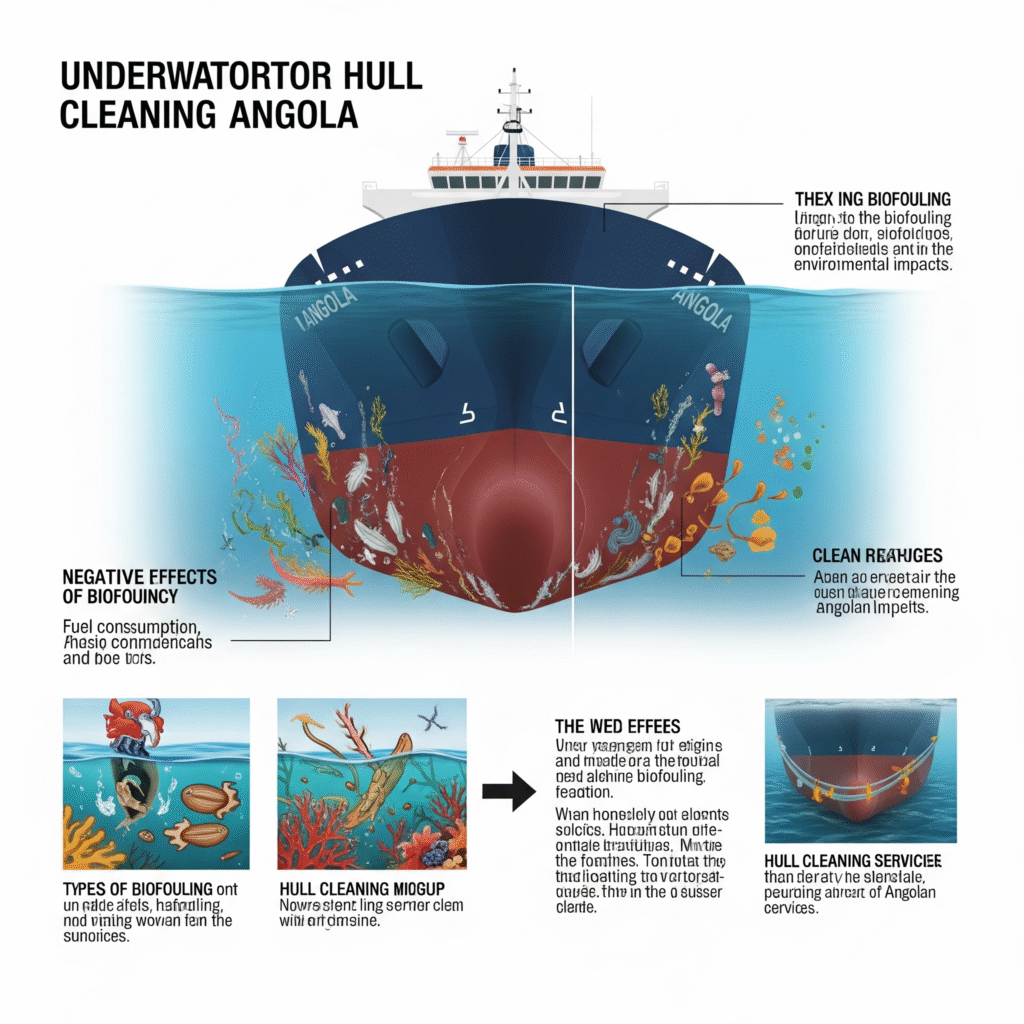
Marine fouling is a natural process where organisms attach themselves to the hull’s surface over time, especially in warm, nutrient-rich waters like those off Angola’s coast. This fouling increases surface roughness, disrupts smooth hydrodynamics, and adds substantial drag, ultimately leading to reduced speed, increased fuel consumption, and greater emissions.
Why Underwater Hull Cleaning in Angola Is Crucial
Angola’s location within the tropical Atlantic makes it particularly susceptible to accelerated marine growth. Warm temperatures and rich biodiversity contribute to faster accumulation of biological material on ships, especially those idle in ports or engaged in offshore drilling support.
Key reasons why underwater hull cleaning is vital for Angola:
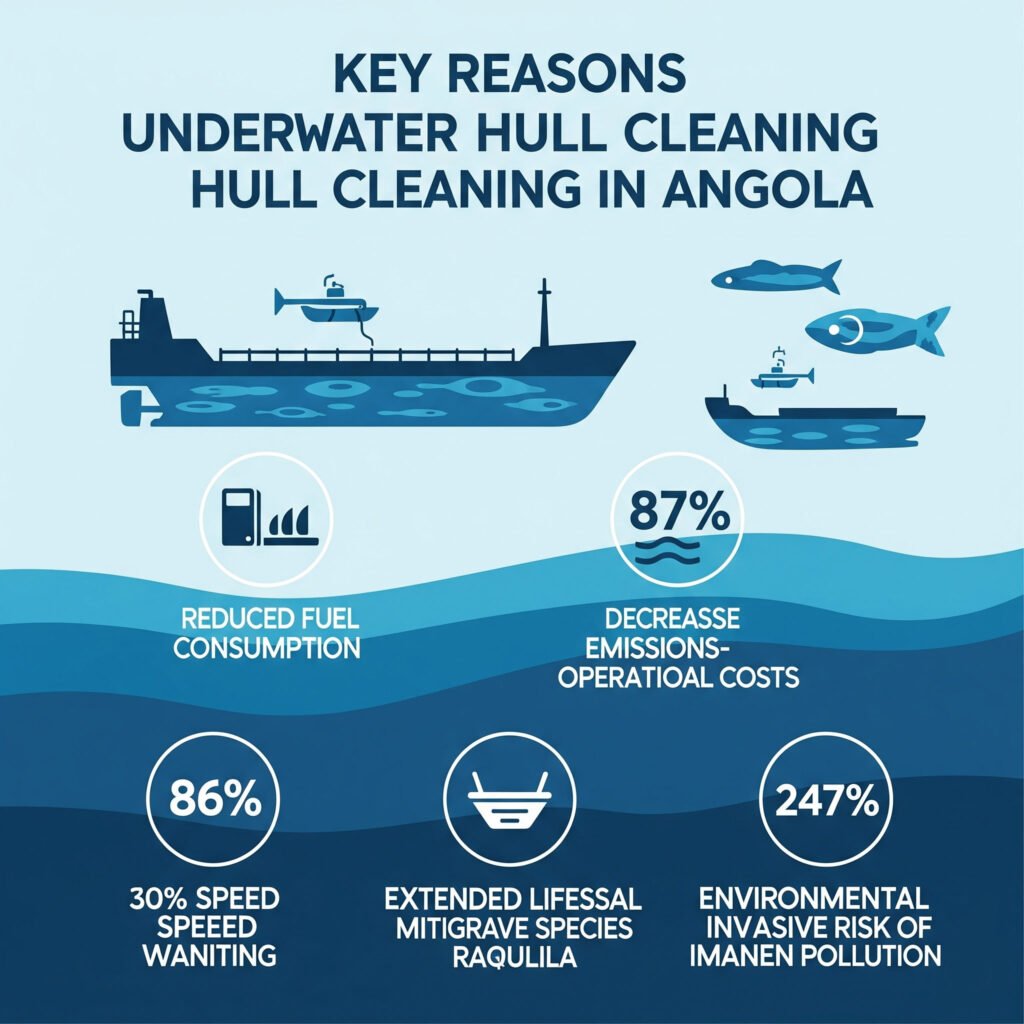
- Operational Efficiency: In a country where shipping is integral to oil exports and import logistics, even a 10% reduction in vessel speed due to hull fouling can disrupt supply chains and timelines.
- Fuel Economy: Fouling can increase a ship’s fuel consumption by up to 40%, significantly raising costs for shipping operators and increasing greenhouse gas emissions.
- Environmental Sustainability: The International Maritime Organization (IMO) has established limits on fuel emissions. Keeping hulls clean reduces resistance and helps vessels operate within these limits.
- Protection of Angola’s Marine Ecosystem: Proper hull cleaning can reduce the spread of invasive species that may otherwise be transported via ships from other regions, helping preserve Angola’s native marine life.
Methods of Underwater Hull Cleaning
Various methods are used for Underwater hull cleaning, each tailored to vessel type, fouling intensity, and available equipment. Common approaches include:
Manual Cleaning by Divers
Divers equipped with scrapers, brushes, and rotary cleaning devices remove marine growth from hulls manually. This method is labor-intensive but highly effective for selective cleaning in specific areas such as sea chests, propellers, rudders, and intakes.
Rotating Brush Systems
These systems use hydraulic or pneumatic brushes mounted on hull surfaces, operated by divers or remotely operated systems. They are suitable for cleaning large flat areas quickly while minimizing coating damage.
Cavitation Water Jets
A highly effective non-abrasive method that uses vapor bubbles to remove fouling through micro-explosions. It cleans deeply without damaging antifouling coatings.
Remotely Operated Vehicles (ROVs)
Advanced ROVs equipped with cameras, cleaning brushes, and data logging systems can perform detailed hull cleaning and inspections. They are ideal for deep-sea ships, high-risk zones, or situations where diver safety is a concern.
The Benefits of Regular Hull Cleaning
Enhanced Fuel Efficiency
Marine fouling increases drag, causing engines to work harder. Regular cleaning restores optimal hull smoothness, improving hydrodynamic performance and reducing fuel consumption by up to 15–30% in many cases.
Lower Maintenance Costs
Neglecting hull maintenance leads to accelerated wear, corrosion, and coating damage. Cleaning removes organisms that contribute to surface degradation and prolongs the life of protective paint layers.
Improved Speed and Maneuverability
Fouling drastically affects a ship’s speed and ability to maneuver efficiently. A clean hull ensures better responsiveness, critical during docking, cargo handling, or emergency situations.
Compliance with International Regulations
Vessels must comply with IMO guidelines, including GHG reduction targets and antifouling standards. Regular hull cleaning supports these efforts and avoids penalties during port inspections.
Environmental Responsibility
Cleaner hulls contribute to lower fuel consumption and reduced emissions of sulfur oxides (SOx), nitrogen oxides (NOx), and CO₂, aligning shipping operations with environmental best practices.
The Growing Industry of Underwater Hull Cleaning in Angola
As Angola’s shipping and offshore sectors expand, there is growing demand for professional underwater maintenance services. Hull cleaning companies are increasingly investing in training, diver certification, and technology adoption to meet this demand.
Key developments include:
- Port-Based Cleaning Operations: Major ports like Luanda and Lobito now support local cleaning operations equipped with tools, skilled divers, and safety facilities.
- Offshore Cleaning Services: Floating platforms and offshore rigs in Angola’s oil-rich waters rely heavily on mobile cleaning units to maintain support vessels and crew supply boats.
- Innovation in Cleaning Techniques: Use of eco-friendly cleaning methods that avoid releasing fouling debris back into the sea, preserving marine biodiversity.
Environmental and Safety Regulations
Operating in Angola’s waters requires strict adherence to local and international environmental and safety standards. These include:
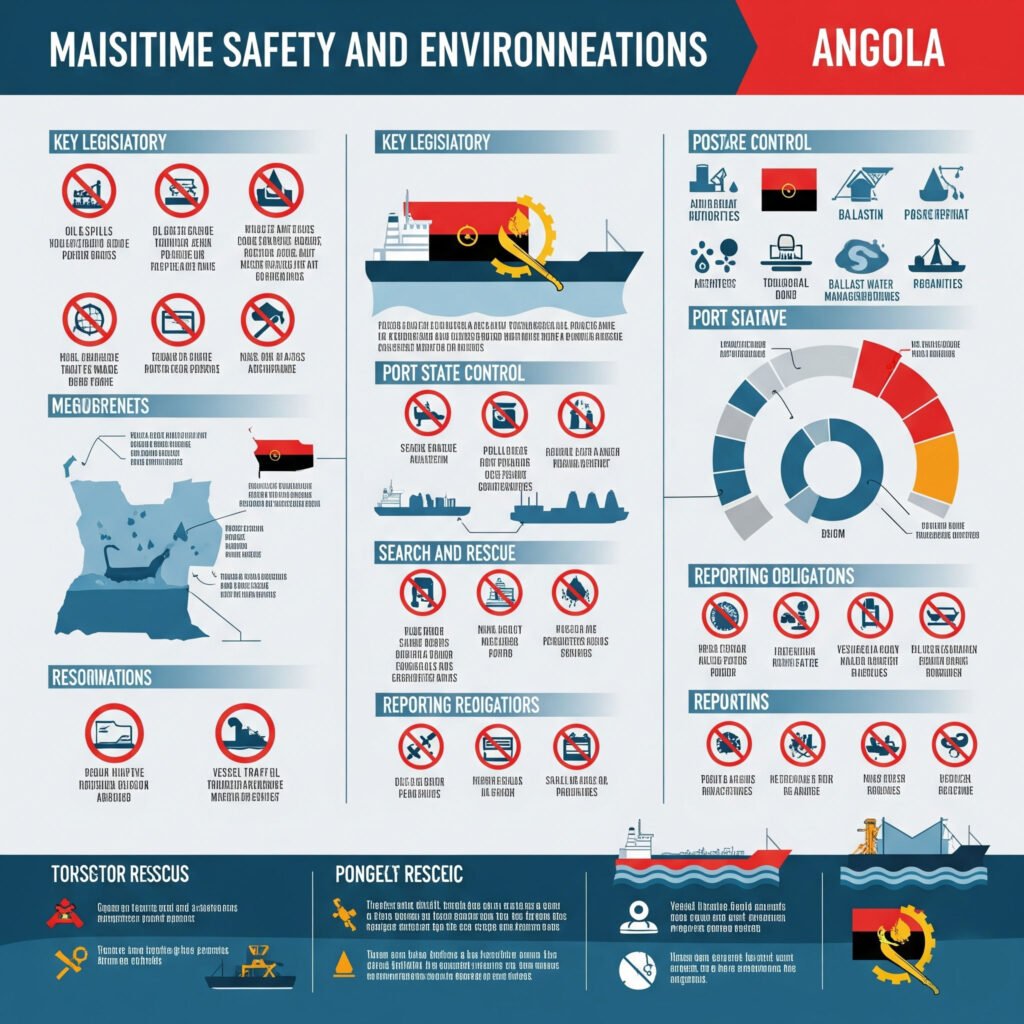
Diver Safety Protocols
All underwater cleaning operations must follow Occupational Safety guidelines, including redundant air supply, supervision by qualified dive supervisors, and emergency evacuation procedures.
MARPOL and IMO Biofouling Guidelines
To minimize the risk of invasive species transfer and marine pollution, cleaning operations must avoid dislodging fouling material into open water. Filtration systems are often used to capture debris for safe disposal.
Port Authority Compliance
Each cleaning session often requires permission from the port authorities. Documentation, environmental impact assessments, and photographic evidence may be required before and after cleaning.
How to Choose the Right Underwater Hull Cleaning Service in Angola
Selecting a service provider is a strategic decision. Factors to consider:
- Experience and Track Record: Opt for companies with a proven history of hull cleaning operations in Angola’s ports and offshore locations.
- Technical Capabilities: Look for advanced equipment, such as ROVs or cavitation cleaning systems, that can ensure effective and safe cleaning.
- Certifications and Training: Ensure the team is certified under international diver safety and marine maintenance standards.
- Inspection and Reporting: A reliable company will offer pre-cleaning inspections, post-cleaning reports, and photographic documentation.
- Environmentally Responsible Practices: Choose providers that use closed-loop systems or in-water debris filtration to reduce environmental impact.
Angola’s marine service sector is growing, with local and international companies offering professional hull cleaning services. Companies like CleanShip are known for their eco-friendly and technologically advanced hull maintenance solutions. They use environmentally safe cleaning methods that comply with global standards.
Future of Underwater Hull Cleaning in Angola
As the country moves toward a more modernized and environmentally conscious maritime sector, several trends are expected to shape the future of underwater hull cleaning:
- Robotics and Automation: Increased adoption of robotic cleaning systems that reduce human risk and deliver more precise cleaning outcomes.
- AI-Driven Hull Monitoring: Predictive maintenance using AI to assess hull condition and determine optimal cleaning schedules.
- Eco-Friendly Hull Coatings: Advances in biocide-free, self-cleaning, or foul-release coatings that reduce the frequency of cleaning.
- Government Support: Angola’s focus on infrastructure development and port modernization may lead to new regulations and subsidies encouraging eco-conscious maintenance practices.
Conclusion
Underwater hull cleaning in Angola is no longer a secondary maintenance task—it is a core part of efficient, compliant, and sustainable maritime operations. With increasing maritime activity driven by oil exports, logistics, and regional trade, keeping vessel hulls clean is essential to economic performance and environmental stewardship.
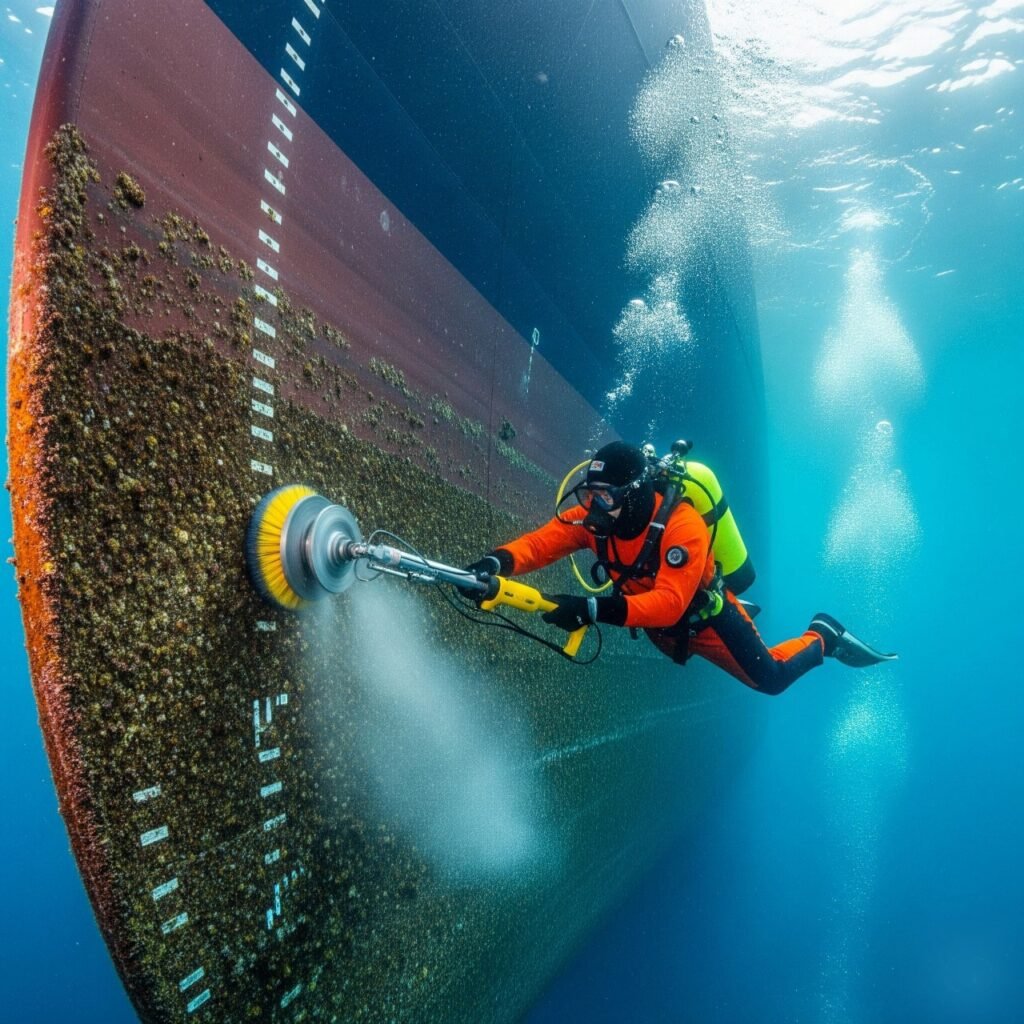
The benefits are clear: cleaner hulls reduce fuel consumption, extend vessel life, ensure compliance with regulations, and contribute to a greener future for Angola’s marine environment.
As Angola continues to build its maritime identity on the African continent, integrating underwater hull cleaning as a routine practice will play a pivotal role in unlocking operational excellence and long-term sustainability for shipping companies, port authorities, and offshore operators alike.
To explore professional, eco-conscious hull cleaning services, consider providers like CleanShip, which offer industry-leading expertise tailored to the needs of modern vessels.
FAQs
1. What is underwater hull cleaning, and why is it necessary?
Underwater hull cleaning is the process of removing marine growth, such as algae and barnacles, from the submerged parts of a ship while it remains afloat. It’s essential because biofouling increases drag, reduces fuel efficiency, and can damage the hull over time. Regular cleaning helps improve vessel performance and extends the hull’s lifespan.
2. How often should vessels undergo hull cleaning in Angola?
The frequency depends on vessel activity and operating environments. In Angola’s tropical waters, where marine growth is rapid, hull cleaning is typically recommended every 3 to 6 months to maintain optimal performance and fuel efficiency.
3. Is underwater hull cleaning safe for the environment?
When performed correctly, yes. Modern hull cleaning methods include debris containment and environmentally safe techniques to prevent the spread of invasive species and minimize pollution. Operators must follow international regulations such as those set by the IMO and MARPOL.
4. What are the main benefits of underwater hull cleaning for shipowners?
The key benefits include reduced fuel costs, increased vessel speed and maneuverability, compliance with international standards, lower emissions, and extended service life of the ship’s coating and structure.
5. Are there certified service providers for hull cleaning in Angola?
Yes, Angola’s ports—such as Luanda, Lobito, and Namibe—have access to trained divers and marine maintenance companies offering certified underwater hull cleaning services. It’s important to choose providers with proper safety certifications, experience, and modern equipment.


